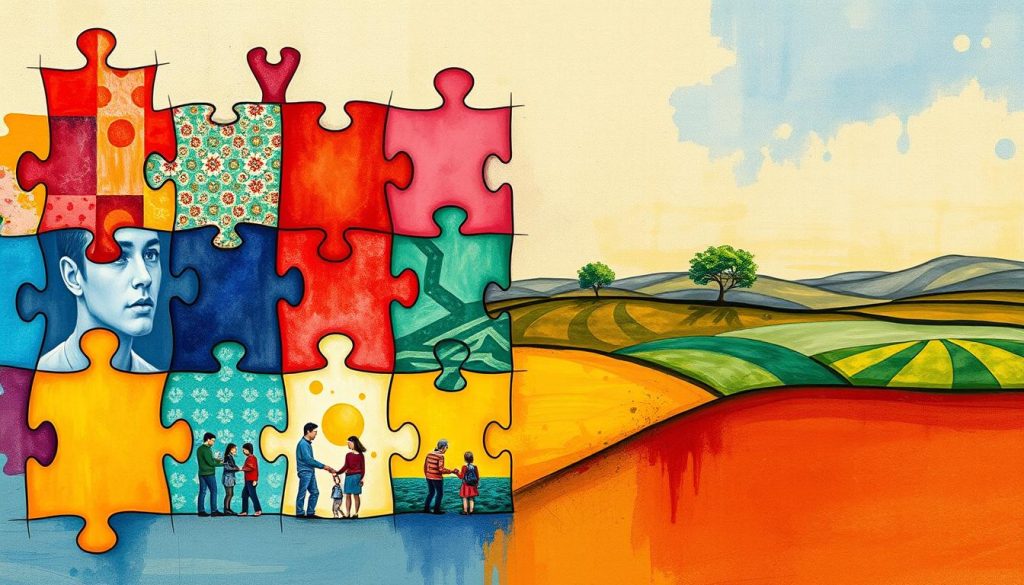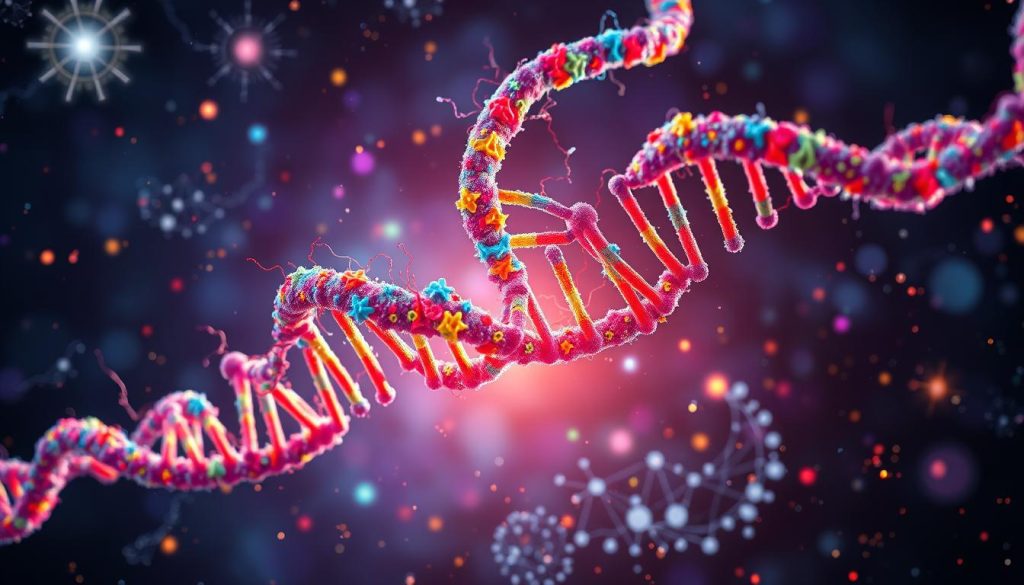Autism spectrum disorder (ASD) is a complex condition that affects people differently. This guide explores the world of autism, covering its signs, causes, and life impact.
We’ll dive into the main features of autism. You’ll learn about early signs in children and its effects on adults. We’ll also discuss the latest research on causes and treatment options.
If you’re a parent, educator, or just curious about ASD, this guide is for you. It offers valuable insights and practical tips to support those with autism.
Understanding Autism Spectrum Disorder: A Medical Overview
Autism spectrum disorder (ASD) is a complex condition that affects communication, interaction, and behavior. To understand autism, we must look at its history, current medical views, and the spectrum concept.
Historical Understanding of Autism
Autism was first described in the 1940s by Leo Kanner and Hans Asperger. At first, it was seen as a rare condition caused by poor parenting. This wrong idea lasted for years, causing pain to families and delaying treatment.
Modern Medical Classification
Today, autism is seen as a neurodevelopmental disorder with varied symptoms. The medical field now knows that autism affects people differently. Symptoms can include trouble with social communication, repetitive actions, and being overly sensitive to sounds or sights.
The Spectrum Concept Explained
The term “spectrum” in ASD shows how the condition can vary. Some people might have mild symptoms and live independently. Others might need a lot of support. This spectrum view helps tailor treatments to each person’s needs, moving away from a one-size-fits-all approach.
| Autism Severity Level | Support Needed | Common Characteristics |
|---|---|---|
| Level 1 | Requires Support | Difficulty initiating social interactions, atypical responses to social overtures |
| Level 2 | Requires Substantial Support | Marked deficits in verbal and nonverbal communication, limited interests |
| Level 3 | Requires Very Substantial Support | Severe deficits in verbal and nonverbal communication, extreme difficulty coping with change |
Seeing autism as a spectrum disorder has changed how we diagnose and treat it. It highlights the need for personalized care and support for those with ASD.
What Is The Autism Disease: Core Characteristics and Features
Autism spectrum disorder (ASD) is a complex condition with various symptoms. Knowing the core features is key to spotting autism early. People with ASD often have unique ways of interacting, communicating, and behaving.

Social communication is a big challenge for those with ASD. They might find it hard to read facial expressions, keep eye contact, or have conversations. This makes it tough to make friends and deal with social situations.
Restricted interests and repetitive behaviors are also common. This can mean intense focus on certain topics, strict routines, or repetitive actions like hand-flapping. While these interests can bring joy, they can also get in the way of daily life.
Sensory sensitivities are another key feature of ASD. Many people with ASD are more sensitive to sounds, lights, textures, or tastes. This can cause discomfort in certain places or make them prefer specific clothes or foods.
- Difficulty with social interaction and communication
- Restricted interests and repetitive behaviors
- Sensory sensitivities
- Challenges with change or transitions
It’s important to remember that autism symptoms vary a lot. Some people need a lot of support, while others can live independently. Spotting autism early can help get the right support, improving life for those on the spectrum.
Early Warning Signs of Autism in Children
Spotting autism in kids early is very important. Parents and caregivers are key in noticing these signs. Let’s look at where signs of autism often appear in young children.
Social Interaction Indicators
Kids with autism might act differently in social situations. They may:
- Avoid eye contact
- Not respond to their name by 12 months
- Prefer to play alone
- Not share interests with others
Communication Development Red Flags
Autism can affect how children talk. Watch for these signs:
- Delayed speech or no speech at all
- Loss of words they used to say
- Not pointing at objects to show interest
- Using odd voice tones or rhythms when speaking
Behavioral Patterns to Watch For
Certain behaviors may hint at autism in children. Look out for:
- Repetitive movements like hand-flapping or rocking
- Strong reactions to sounds, smells, or textures
- Strict routines that are hard to change
- Intense focus on specific objects or topics
Remember, every child grows differently. If you notice these signs, talk to your doctor. Early help can make a big impact for kids with autism.
The Genetic and Environmental Factors Behind Autism
Exploring what causes autism is complex. Research shows a mix of genetic and environmental factors lead to autism spectrum disorder (ASD). Scientists are dedicated to understanding these causes.
Genetics are a big part of ASD. If one identical twin has autism, the other twin is likely to have it too. Certain genes may raise the risk of autism. But, it’s not just one gene – many are involved.

- Advanced parental age
- Maternal infections during pregnancy
- Exposure to certain chemicals
- Complications during birth
The mix of genes and environment is key. Some might have a genetic risk, but environmental factors can trigger ASD.
| Factor Type | Examples | Risk Level |
|---|---|---|
| Genetic | Gene mutations, family history | High |
| Environmental | Prenatal exposure, birth complications | Moderate |
| Combined | Gene-environment interactions | Variable |
We’ve made progress in finding autism causes, but there’s more to learn. Ongoing research aims to understand autism better. This will help in early detection and treatment.
Diagnosing Autism: Methods and Procedures
Diagnosing autism is a detailed process. It uses many tools, expert evaluations, and criteria based on age. This helps spot autism symptoms and get a correct diagnosis.
Screening Tools and Assessments
Doctors use several tools to find signs of autism. These include:
- Modified Checklist for Autism in Toddlers (M-CHAT)
- Social Communication Questionnaire (SCQ)
- Autism Diagnostic Observation Schedule (ADOS)
These tools help spot early signs and guide more detailed checks.
Professional Evaluation Process
Getting a diagnosis of autism needs a team of experts. This team usually does:
- Developmental screenings
- Comprehensive diagnostic evaluations
- Medical and genetic testing
- Speech and language assessments
Experts watch behavior, check thinking skills, and look at how well someone talks. This helps make a precise diagnosis.
Age-Specific Diagnostic Criteria
Autism shows up in different ways at different ages. The criteria take these differences into account:
| Age Group | Key Diagnostic Considerations |
|---|---|
| Toddlers (1-3 years) | Language delays, lack of eye contact, repetitive behaviors |
| Children (4-11 years) | Social difficulties, restricted interests, sensory sensitivities |
| Adolescents and Adults | Challenges in relationships, employment, and independent living |
Knowing these age-based criteria helps experts tailor the diagnosis. This ensures accurate results.
Common Symptoms Across Different Age Groups
Autism symptoms change with age, making early detection key. Toddlers might not speak on time, avoid eye contact, and not play with others. They might not answer when called by their name or play like other kids.

School-age kids with autism may miss social clues, have strong interests, and repeat actions. They might find it hard to make friends or follow social rules. They could also be very sensitive to sounds and sights.
Teenagers with autism might find abstract thinking hard and struggle with routine changes. They could have trouble understanding jokes or sarcasm. Feeling left out can be a big problem for them.
Adults with autism might find it tough to keep relationships and jobs. They could struggle with organizing and managing time. Some adults hide their autism, which can make them feel stressed and anxious.
- Toddlers: Delayed speech, limited eye contact
- School-age: Social struggles, intense interests
- Teenagers: Abstract thinking difficulties, social isolation
- Adults: Relationship and employment challenges
Spotting autism symptoms at different ages helps in getting the right support. Remember, autism affects people in many ways, and each person is unique.
Treatment Options and Intervention Strategies
Autism treatment and therapy have grown a lot in recent years. Experts now use many ways to help people with autism spectrum disorder (ASD) do well. Let’s look at some important strategies.
Behavioral Therapies
Behavioral therapies are key in many autism treatment plans. Applied Behavior Analysis (ABA) is a common method. It teaches skills in small steps and rewards good behavior. Other methods include:
- Cognitive Behavioral Therapy (CBT)
- Social Skills Training
- Occupational Therapy
Educational Interventions
Special educational programs are vital for kids with ASD. These might include:
- Special education classes
- One-on-one aides
- Speech and language therapy
The aim is to make a learning space that fits each child’s needs.
Medical Management
Even though there’s no cure for autism, some medicines can help manage symptoms. These might help with:
- Anxiety
- Depression
- Attention issues
- Aggressive behaviors
It’s key to work closely with healthcare providers to find the right mix of autism therapy. Each person’s treatment plan should be as unique as they are.
Supporting Children with Autism in Educational Settings
Schools are key in helping kids with autism grow. They need to make places where everyone feels included. This helps all kids learn and make friends.

Individualized Education Plans (IEPs) are vital for kids with autism. They set goals and ways to help each student. Teachers and families work together to make these plans work.
Changing the classroom can really help kids with autism. Some good changes include:
- Visual schedules and timers
- Quiet spaces for sensory breaks
- Flexible seating options
- Noise-canceling headphones
Teachers and families need to work together. Talking often helps keep things the same at home and school. This teamwork helps kids with autism learn important skills and do well in school.
| Strategy | Benefit |
|---|---|
| Visual aids | Improved comprehension and communication |
| Structured routines | Reduced anxiety and increased predictability |
| Social skills training | Enhanced peer interactions and friendships |
| Sensory-friendly spaces | Better focus and emotional regulation |
By using these strategies, schools can help all students succeed. This includes those with autism. It makes the whole school a better place for everyone.
The Role of Early Intervention in Autism Management
Early intervention is key in managing autism spectrum disorder. Spotting signs early and starting treatment can greatly help children with autism. Let’s look at the benefits of early detection and the intervention programs available.
Benefits of Early Detection
Finding autism early means starting therapy sooner. This can greatly improve a child’s development. Early help can boost communication, social skills, and thinking abilities.
It also helps families adjust and create a supportive home environment for their child.
Available Intervention Programs
There are many autism treatment programs for early intervention. These include:
- Applied Behavior Analysis (ABA)
- Speech and Language Therapy
- Occupational Therapy
- Social Skills Training
Each program focuses on different areas of development. They tailor therapy to meet the child’s unique needs.
Parent-Mediated Interventions
Parent involvement is vital in early intervention. Parent-mediated interventions help families play a big role in their child’s treatment. They teach parents how to support their child’s growth at home.
This reinforces skills learned in therapy sessions.
| Intervention Type | Focus Area | Typical Age Range |
|---|---|---|
| ABA | Behavior modification | 2-6 years |
| Speech Therapy | Communication skills | 18 months – 5 years |
| Occupational Therapy | Daily living skills | 3-7 years |
| Parent-Mediated | Family-based support | All ages |
Managing Autism in Adolescence and Adulthood
Living with autism brings special challenges as people grow into their teens and adults. Good treatment plans can help them through this tough time and live happy lives.

For teens with autism, planning for the future is key. This means setting goals for school, work, and living on their own. Schools and families must work together to make a plan that fits the person’s strengths and needs.
Getting ready for work is important for young adults with autism. Training in job skills, social interactions, and how to act at work can really help. Some companies even offer special jobs and internships for people on the spectrum.
Adults with autism need ongoing support. This can include:
- Counseling and therapy
- Social skills groups
- Supported living arrangements
- Continued education opportunities
Assistive technologies can also help. Apps, smart home devices, and special software can make life easier and more independent.
With the right strategies and support, people with autism can face the challenges of growing up. They can lead more independent and happy lives.
Social Skills Development and Support Systems
Living with autism brings unique challenges in social interactions. Effective therapy aims to build essential social skills. This improves quality of life. Let’s look at key strategies for social development and community integration.
Building Communication Skills
Communication is key for those with autism. Speech therapy, visual aids, and technology help. Role-playing and social stories also help practice real-life scenarios.
Developing Peer Relationships
Fostering friendships is vital for those with autism. Social skills groups offer safe spaces for practice. Activities like board games or sports encourage teamwork and turn-taking.
Peer mentoring programs pair individuals with autism with neurotypical peers. This promotes mutual understanding.
Community Integration Strategies
Integrating into the community is a key goal. Community outings, like trips to the store or library, offer practical experience. Vocational training prepares individuals for jobs.
Supportive employment services help match skills with jobs. This ensures a good fit.
| Social Skill Area | Therapy Approach | Benefits |
|---|---|---|
| Communication | Speech therapy, visual aids | Improved verbal and non-verbal expression |
| Peer Relationships | Social skills groups, structured activities | Enhanced social interaction, friendship formation |
| Community Integration | Community outings, vocational training | Greater independence, employment opportunities |
By focusing on these areas, individuals with autism can develop vital social skills. They can form meaningful relationships and participate in their communities. Remember, progress takes time and patience. But with consistent support, significant improvements are possible.
Autism’s Impact on Family Dynamics
Living with autism brings unique challenges to family life. When a child is diagnosed with autism, it affects everyone in the household. Parents often find themselves juggling multiple roles – caregiver, advocate, and therapist. This can lead to stress and strain on relationships, but many families also report growing closer through shared experiences.
Siblings of children with autism face their own set of challenges. They may feel neglected or overshadowed by their sibling’s needs. At the same time, many develop increased empathy and understanding. Families can foster positive relationships by encouraging open communication and carving out special time for each child.
Extended family members play a key role in supporting families living with autism. Grandparents, aunts, and uncles can provide respite care and emotional support. Understanding neurodevelopmental conditions helps family members offer meaningful assistance and create a supportive environment for children with autism.
Maintaining healthy family dynamics while caring for a child with autism requires effort and understanding. Support groups, family counseling, and respite care services can help families navigate challenges and build resilience. By working together and seeking support when needed, families can thrive while providing the best care for their child with autism.
FAQ
Q: What is autism spectrum disorder (ASD)?
A: Autism spectrum disorder (ASD) is a complex condition. It affects how people communicate, have interests, and behave. It’s called a “spectrum” because it impacts people differently.
Q: What are the main signs of autism?
A: Signs of autism include trouble with social interactions and communication. People with autism might avoid eye contact or have delayed speech. They also might have intense interests and repeat certain behaviors.
Q: What causes autism?
A: Autism’s causes are not fully known. But, research points to genetics and environment. Genes and things in the environment during pregnancy or early childhood might play a role.
Q: How is autism diagnosed?
A: Doctors diagnose autism through detailed evaluations. This includes developmental screenings and behavioral assessments. Specialists look at the person’s history and current behaviors.
Q: At what age can autism be diagnosed?
A: Autism can be diagnosed as early as 18 months. But, many are diagnosed later. Early signs can be seen before a child is two, and early help is key.
Q: Is there a cure for autism?
A: There’s no cure for autism. But, treatments and interventions can greatly improve life. These might include therapy, education, and sometimes medicine.
Q: How does autism affect daily life?
A: Autism can make daily life challenging. It can affect social interactions, communication, and sensory sensitivities. But, with the right support, many people with autism lead happy lives.
Q: Can adults be diagnosed with autism?
A: Yes, adults can be diagnosed with autism. Some may not have been diagnosed as children. An adult diagnosis can help them get the support they need.
Q: How can I support a family member with autism?
A: Supporting a family member with autism means learning about it and being patient. Encourage their strengths and create a supportive environment. Professional help and support groups can also be helpful.
Q: Are there any famous people with autism?
A: Yes, many famous people have autism. Examples include Temple Grandin, Dan Aykroyd, and Anthony Hopkins. Their success shows the wide range of abilities in people with autism.


















